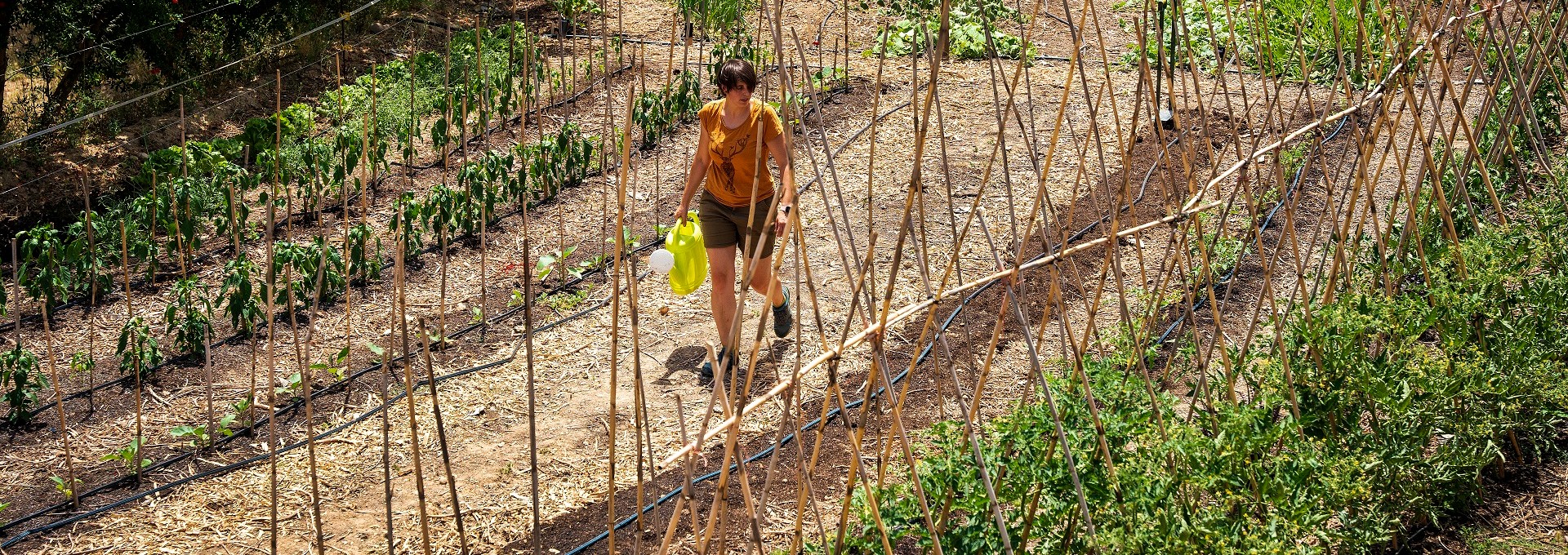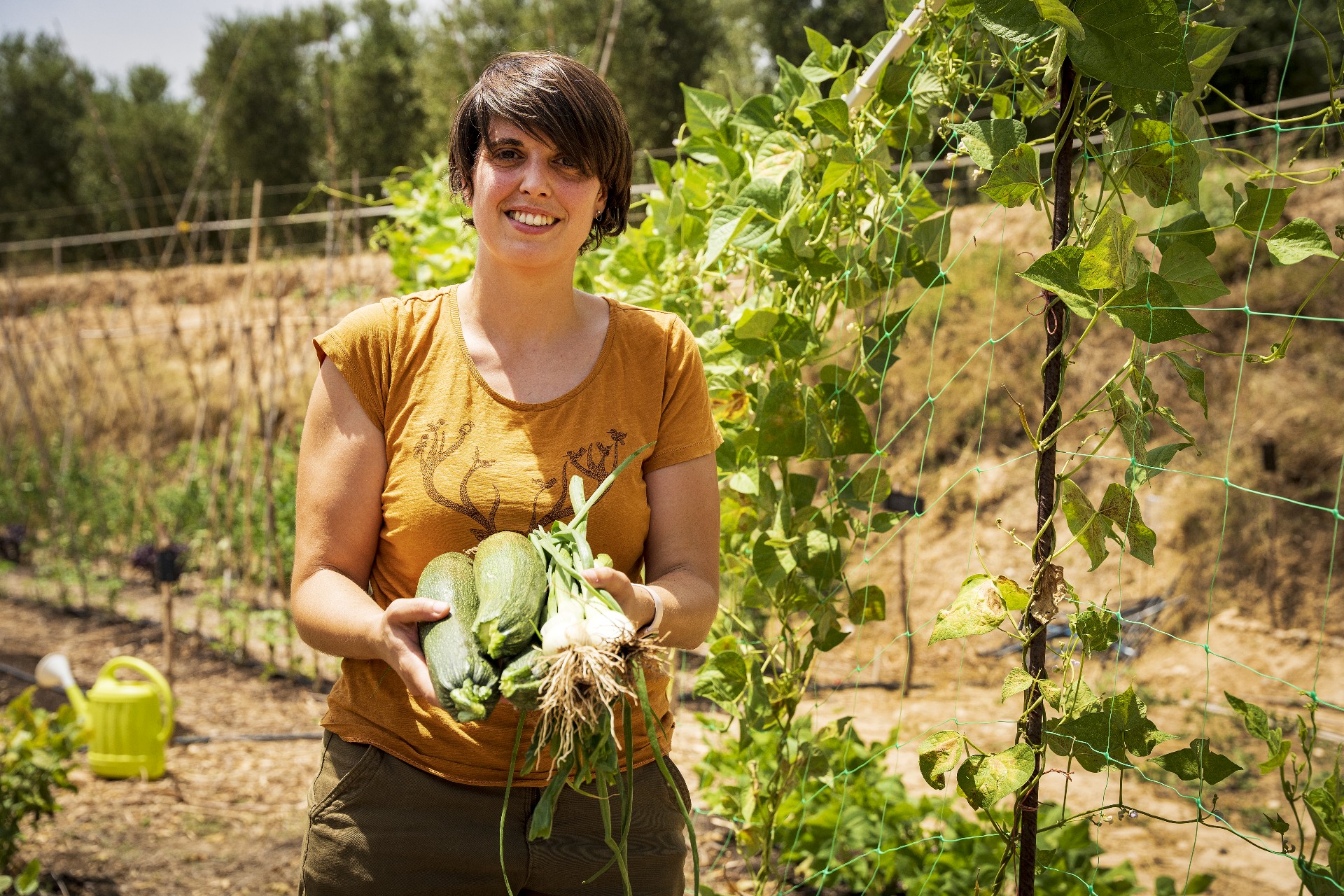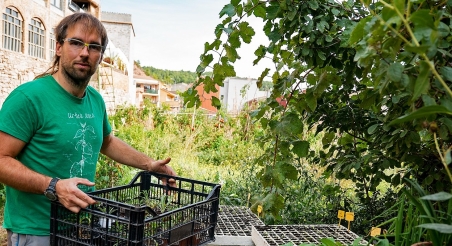Isabel Simó (Terrassa, 1984) developed a strong bond with vegetable gardens and agriculture after travelling around the world with Christa, her partner. During their trip, they met people who led very different lives from their own, and they were captivated. Although they both come from farming stock, on their travels they discovered permaculture, an approach to agricultural design based on organic and regenerative farming practices.
In the wake of the Covid-19 pandemic, they decided to offer the residents of Ullastrell a space in which to eat more healthily while learning together about agriculture. The great news was that they had the perfect site for it: one of the vegetable gardens belonging to Isa’s father, the farmer Enric Simó, who owns the Els Campaners estate. With a 600 m2 strip on a 3.5 ha plot, Isa and Christa were able to start up the community garden project they’d been dreaming of.
Both Isa and Christa have farming roots, but they’d never had a vegetable garden of their own or experienced the meaningfulness and excitement of growing their own vegetables. Although they both used to work in the fields farmed by their respective families, they only carried out specific tasks, such as picking potatoes or cherries. They collaborated when there was work to be done, but they weren’t involved in the crop growing process. For example, they’d never considered what was involved in tending to a cherry tree for the entire year.
In fact, the message drummed into them growing up was: «Do whatever you like, but don’t go into farming. Go and study!» Their families didn’t see farming as a viable career option for making a decent living, but rather as an extremely tough job. Isa and Christa’s families always instilled in them that pursuing a degree would be a fer better option. They listened to them: Isa trained in design and advertising and now works as a designer, while Christa is a schoolteacher. Isa likes her job but regrets having lost touch with nature.
A vegetable garden to reconnect with the land
After the pandemic, the couple decided to embark on a radical change in their lives. They left behind their conventional life in Switzerland, instead focusing on horticulture with the aim of connecting with their origins. The materialisation of his initial idea surpassed all their expectations. They started off by sending out a WhatsApp message to their family and friends explaining that they wanted to set up a vegetable garden and that they were looking for people willing to collaborate with them. More than 100 people signed up, perhaps because their proposal arrived amid the mobility restrictions imposed to curb the spread of Covid-19, when everyone was longing to get out of the house. However, they had to pick and choose candidates, because they were looking for people willing to commit to the project for at least a year, believing that during this time they could learn a lot. The project has been running for three years now, and nobody wants to quit.
Isa and Christa lived for two consecutive years in Ullastrell, where they began to understand what looking after a plot of land entailed, in their case integrating permaculture farming practices. They were keen to observe and discover how food grows, shifting away from the seemingly indissoluble bond that exists between farming and self-sacrifice.
During this process, they realised that Isa’s father unknowingly practices permaculture. Without being aware of doing so, he already applies techniques that have been transmitted from generation to generation, things that Isa’s grandfather taught him based on the principles of nature-based farming: for example, understanding the importance of keeping trees on the edges of the vegetable garden in order for them to repair the soil and prevent erosion, as well as bearing fruit and providing shade.
The community vegetable garden doesn’t pay any rent, since Isa feels that her father has enough land to let them use part of it. The initiative is geared towards collective learning. Neither Isa nor her partner see it as a business opportunity, but rather they consider themselves amateurs keen to explore organic farming, as do the other 12 people who are currently involved in the project. The goal is to eat more healthily and more sustainably, without having to work every day in the vegetable garden.
The tasks are distributed among all the participants so that growing vegetables doesn’t become a burdensome obligation: «It would be very irksome for us to have to come here every day to water the crops in the summer, when it’s so hot.» What’s more, Isa feels that she’s struck a perfect balance between her work as a designer and her tasks in the community garden. She has no wish to spend the entire day in the vegetable garden and acknowledges her need to stay connected to the digital world through her computer. Having responsibility for the garden helps her maintain a balance. On top of this, she can apply her knowledge of design to farming-related issues. For instance, she’s created the website and online store of this family farming project, and handles all communication matters.
From the earth to the table
Recalling their round-the-world trip, the couple have special memories of a retreat in Thailand. For a week, they cooked and tasted local produce grown on site. «When you eat well and from the land, everything works better,» says Isa. Through this experience, they became aware of the importance of growing what you eat, of knowing where your food comes from and how it benefits your gut and health in general.
«When you eat well and from the land, everything works better» Isabel Simó
Isa thinks it’s hard to adopt a totally organic and local diet. However, with the community garden project, their goal is to ensure that a large proportion of the food they eat is grown one kilometre from their home at the most. As such, they’re not only changing how they eat, but also how they relate to other people. As she sees it, having a vegetable garden not only entails the responsibility of cultivating the land, but also that of cooking seasonal products. «When you have a vegetable garden, your menu changes because all of a sudden you have Swiss chard, spinach and Brussels sprouts in the fridge that you have to cook before they go off,» she explains.
Despite acknowledging the value of organic and local farming certificates, she believes that regenerative agriculture and permaculture farming practices go further. This approach to agricultural production systems attaches greater importance to the nutrients of the grown produce and their contribution to the health of the soil. Isa questions the wisdom of monoculture practices, which are sometimes used in organic farming: «You know that this artichoke won’t harm your body, but you’re harming nature by allocating so many hectares exclusively to growing artichokes.»
Growing, learning and connecting
The community garden is now in its third season and people have mainly got involved in the project in order to grow their own food and take it home with them. They meet up two to three times a week; more frequently during the summer. Everything they grow is distributed among the members of the group. Since starting up the community vegetable garden, Isa has learned to recognise the shapes and origins of plants such as Brussels sprouts or peas. She knew what the final product looked like, but now she’s familiar with the physical appearance of horticultural products. «It’s a real gift to be able to see the entire growth cycle of the plant, from seed to fruit,» she says. This was precisely what she was aiming to achieve: to understand how the entire life cycle works, how a new season begins and how organic waste can be used to make compost.
«It’s a real gift to be able to see the entire growth cycle of the plant, from seed to fruit» Isabel Simó
Tomatoes are her favourite product from the vegetable garden. She swears they have a flavour she’d never tasted before and that it’s a pleasure to be able to eat them just a few minutes after picking them. Nowadays, she finds tomatoes from elsewhere tasteless. «They’re not harvested in their prime and most of their nutrients are lost,» she says.
They avoid using the tractor in the vegetable garden so as not to destroy the structure of the soil and to disturb as little as possible the organisms that live there. They adopt the approach of minimal interference with the earth. As they see it, ploughing a field is equivalent to having a hurricane sweep through it. In this respect, Isa looks up to two people in particular: Jean-Martier Fortier, whom she considers her guru, and Charles Dowding, an elderly YouTuber who’s excellent at explaining things in a simple, practical way. She discovered Jean-Martin Fortier through his book The Market Gardener, a renowned guide for creating vegetable gardens in small spaces. That said, Isa points out that the community vegetable garden she runs is the ideal size. Because it’s small, they’ve been able to apply techniques that they never imagined would work, such as covering the entire surface area with cardboard, placing compost on top of it and planting their produce through small holes. This technique makes it possible to maintain the moisture of the soil while reducing the need for irrigation. In addition, they always keep weeds at bay.
Fostering generational renewal
Isa wouldn’t change the path she chose of pursuing a degree, but she thinks it may have taken her a little too long to realise the importance of acknowledging her origins. «At 38 years old, I still haven’t rediscovered everything I have here,» she states with pride. She believes it’s necessary to foster generational renewal through a love for farming, as well as by providing training for people who don’t come from farming stock but who are keen to get involved. It’s about smoothing the path for them. «We’ve become too accustomed to the phrase ‘This is the way it’s always been done’,« she says. She feels it’s necessary to shift this mindset, seeking out ways to facilitate real access to land for potential farmers. In her opinion, land banks do work, but there are still a lot of people with land which they don’t cultivate, preferring to rent it out, even for just 100 euros a month. «Unfortunately, money talks and greed prevails,» she says.
Since Isa currently has two jobs (one in design and the other in farming), she’s registered as a freelancer in two separate categories, which complicates the harmonious relationship she’d like to maintain between the two worlds. As she sees it, society adapts and transforms itself so much faster than institutions and bureaucracy. She acknowledges that it’s not in her interests to have two jobs and laments the fact that most people concede defeat before trying anything.
In Ullastrell, most farmers are around her father’s age, in the 65-80 age bracket, while the youngest, after her, is 50 years old. She says that while this isn’t such a strongly agricultural area as the Pre-Pyrenees or Lleida, there’s a lot of land available for cultivation and, moreover, it’s located very close to Barcelona. Nevertheless, generational renewal isn’t happening. «There are areas to be farmed, but there isn’t anyone who wants to do this work,» she complains.
«There are areas to be farmed, but there isn’t anyone who wants to do this work» Isabel Simó
Patience, an essential quality
Isa’s relationship with the land has taught her the importance of patience. She believes this virtue is essential not only when it comes to working with plants, but also in every aspect related to farming, whether it’s applying for licences, dealing with administrative bodies or working collectively in the vegetable garden.
She considers that society still doesn’t fully appreciate the enormous benefits of carrying out tasks on a community basis: «When we get people involved in a collective project, we get the very most out of everything.»
«When we get people involved in a collective project, we get the very most out of everything» Isabel Simó
One of the challenges of the community vegetable garden is to find the balance between the work involved and the number of people in the group. Isa thinks that, as things stand, they need five more people. They’ve started posting updates about the vegetable garden on Instagram and are keen to open up the vegetable garden even more to the local community. In fact, Isa is considering expanding the project to introduce more people to farming, especially young people. She explains that once you know the process and meaning of growing a tomato here, you really start to appreciate it. Her long-term idea is to sell their produce direct from the vegetable garden, to open it up to schools, groups and families, and even to invite people to pick calçots (Catalan green onions), cook them and eat them right here. «I want to take all the things we already do together and bring them out here into the vegetable garden, even staging a concert among the tomato plants!» she says.
Isa is convinced that in order to make all this happen, you have to start small and take baby steps. She and her partner both see it as a life project: «Some people invest in government bonds, while we invest in our own local farming project.» Although two years ago her parents and family had misgivings about the initiative, now they’re beginning to understand that it’s a forward-looking project and that this is the right path to follow in order to conserve nature.
«Some people invest in government bonds, while we invest in our own local farming project» Isabel Simó
More than just a space for growing produce
In September of last year, Isa and her partner went back to Switzerland because there was more work for them there. For the first few days they wondered how things would go in the vegetable garden. However, when they returned, they realised that all they had to do was delegate, since the other members of the project were keen to keep things running smoothly. Currently, each of them comes back at least once a month, and they’ve seen how the community vegetable garden has become much more than just a space for growing produce. It’s a place where people reconnect with their roots, connect with nature and inspire each other. Through this experience, they’ve learned to appreciate fresh, healthy foods that they can grow with their own hands. The bonds they’ve established in the vegetable garden are just as important as the fruit and vegetables that come out of the earth. It’s a constant reminder of the strength of community and the power of collaboration.
This small green corner is a living testimony to how we can transform our environment and, at the same time, transform ourselves.
— BCN Smart Rural Editorial —




